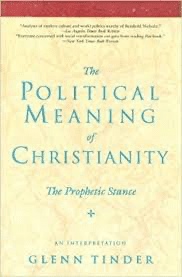The Political Meaning of Christianity: Relevance to MAGA
Some of us have been reading and discussing The Political Meaning of Christianity by Glenn Tinder. This is my final post about it. If you have been reading the book, feel free to comment; if you have not been reading it, feel free to ask a question.
The final chapter is entitled “Prophetic Spirituality.” Then comes the Postscript entitled “World Politics.” It is there, in the Postscript, that Tinder makes some comments that I believe bear on the current wave of American Christian Nationalism.
But, first, a quotation from Prophetic Spirituality that gives away the gist of the whole chapter (which I found quite confusing):
”The prophetic stance means not sadness and resignation but a paradoxical joy—the joy expressed by Paul when he wrote, ‘Far be it from me to glory, except in the cross of our Lord Jesus Christ, by which the world has been crucified to me, and I to the world.’ There is no avoiding the Cross. The politics of the twentieth century, devoted either to maintaining and increasing the pleasures of a consumers’ society or else to creating a worldly paradise through revolutionary action, has bent every effort to avoiding the Cross. In this way, sometimes frivolously, sometimes fiercely, we have caricatured our ancient paradisiacal hopes. To the world we have thus created, we must be crucified. The standard of prophetic expectancy forbids us to glory in material prosperity or revolutionary projects. But it does not forbid us to glory. If the Cross means life as well as death, we are not faithful to the Cross unless we live, now, rejoicing in the day the Lord has made.” (234)
But now to Postscript: World Politics. Here is a crucial quote from it:
”The prophetic stance means standing apart from the disorder and violence of the world and representing the ideal of a community comprising all nations and peoples. Christians who share whole-heartedly in the self-righteousness of a nation or the conceit of a race have, at least for the moment, suspended their faith.” (236)
Tinder goes on to say the same thing several times in different ways. On page 242 he condemns “national pride” and calls on the churches to condemn it.
For Tinder, as for Stanley Hauerwas, authentic Christian identity transcends national identities; it is universal in its vision and identification with Christians of all nationalities and races and tribes.
Tinder also says that Christianity is pacifist, or “pacific,” in its posture toward war while realistically acknowledging that war is a lesser evil than inaction.
Next, in about two weeks, we will take up Austin Fischer’s excellent book Us for Them. Buy it and join me as we begin discussing Chapter 1 “Justice + Friendship: An Invitation to … Higher Ground.”
*Note: If you choose to comment, make sure you have read the relevant pages in the book. If you have not, feel free to ask questions. In either case, please keep your comment or questions relatively brief (less than 100 words), on topic, addressed to me, civil and respectful (not hostile or argumentative) and devoid of pictures or links.*














